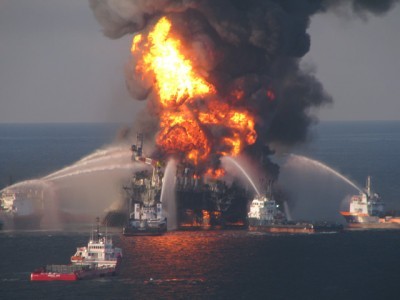
Just as memories of the 2010 Deepwater Horizon oil rig disaster were starting to fade from public consciousness, an action-heavy movie version is set to bring them back, front and center.
“Deepwater Horizon,” set for release at the end of the month, is an intense, big-budget depiction of the events immediately before, during and after the blowout and explosion at the ultradeep-sea drilling rig off Louisiana. The events left 11 workers dead and set off the worst oil spill in U.S. history.
The filmmakers were aiming for a tribute to the victims and the survivors, but they also take some shots at the managers on the rig who worked for BP Plc, the majority owner of the well. In the Lions Gate Entertainment Corp. movie, which premiered at the Toronto International Film Festival this week, the BP supervisors on board are portrayed as placing profit above safety and pushing workers to keep operating even after they raise concerns about the well’s integrity.
‘New Audience’
“Something like this, especially a big release, is always a way of bringing back the memories,” said Robert Thompson, director of the Bleier Center for Television and Popular Culture at Syracuse University. It potentially reframes and “introduces the story to a whole new audience.”
Directed by Peter Berg (“Friday Night Lights,” “Lone Survivor”), the film focuses on Mike Williams ( Mark Wahlberg), the real-life senior electrician who is one of the staff portrayed as calling out BP for being too focused on money. Two-time Oscar nominee John Malkovich plays Donald Vidrine, the BP manager who helped oversee the Macondo well. He clashes with Jimmy Harrell, played by Kurt Russell, a manager for Transocean Ltd., which owned and operated the rig.
Weeks past schedule and millions of dollars over budget, the crew is depicted relenting to BP’s pressure and begins preparing to plug the well and move on to a new location, a procedure that requires clearing out the drilling mud that was holding down the pressure of the oil below.
Catastrophic Series
That leads to a series of dramatic action sequences. The well blows out, spouting oil, gas and mud to the top of the gigantic derrick. Gas enters the rig’s engines, causing a catastrophic series of explosions that rip through the deck and engine rooms. Workers are cut down by fireballs and sprays of shattered glass. As crew members try desperately to save the rig and then themselves, the camera pans up regularly to display a hellish scene of their world and the ocean engulfed in flames.
Shot in south Louisiana, the film used current and former oil workers in roles. Berg said he faced resistance from BP employees. “This was a film that BP probably wasn’t thrilled was getting made,” Berg told the Press Association.
Spokesmen for BP in Houston didn’t return requests for comment made via e-mail and phone.
‘Tragic Night’
“While this will undoubtedly be a dramatized portrayal of what took place on the tragic night of April 20, 2010, all of us at Transocean remain forever mindful of this incident, honor the lives that were lost and continue to recognize the brave, heroic and highly professional actions of the rig’s crew that night,” Pam Easton, a Transocean spokeswoman, said in an e-mailed statement. She added the company wasn’t involved in the making of the movie.
Will filmgoers go see “Deepwater Horizon”?
Initial reviews have been positive. “It’s rare to see a mainstream film with the guts to double as a takedown of a multibillion dollar company,” Benjamin Lee wrote in The Guardian, also describing it as a worthy tribute to the brave workers involved.
The filmmakers spent $118 million on the movie in Louisiana, according to filings with the state. Lions Gate will share the costs with its partners in the project and typically pre-sells international distribution rights.
‘Jingoistic Nature’
The movie might benefit from the success of another true-life tale released last weekend, “ Sully,” about the US Airways pilot who safely landed his Airbus A320 in the Hudson River in 2009 after losing both engines to bird strikes, said Jeff Bock, senior box office analyst at Exhibitor Relations Co. Like the filmmakers behind “Sully,” Berg “taps into the jingoistic nature of American filmgoing,” Bock said.
Wahlberg said during an on-stage interview ahead of the premier in Toronto that he was drawn to the film project after he read the script and a New York Times investigation, on which the movie was partly based. He said he was attracted to the film for what it celebrated, not for what it attacked.
“I just thought it was a fascinating story,” Wahlberg said, “what these people were faced with and what they had to overcome.”